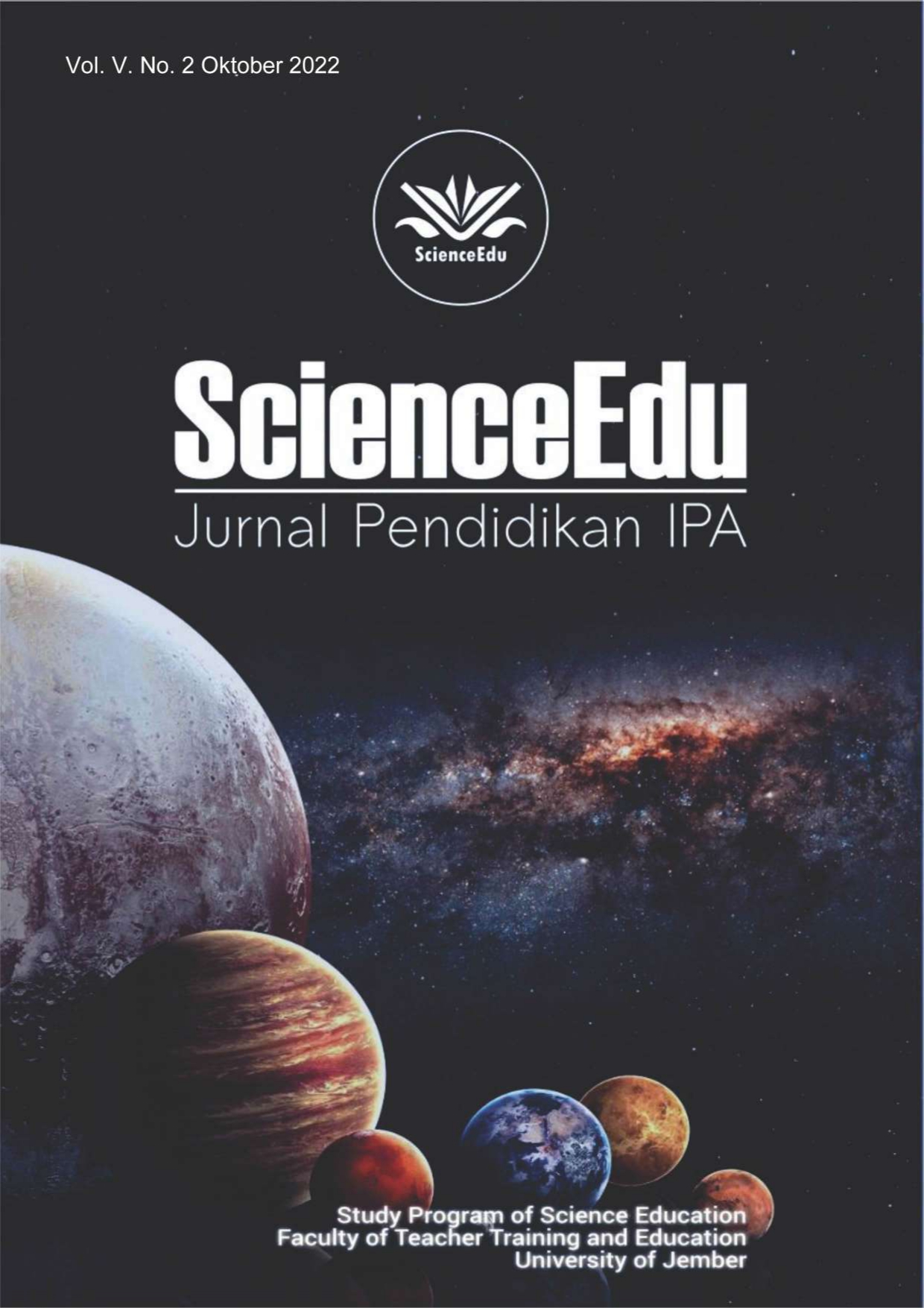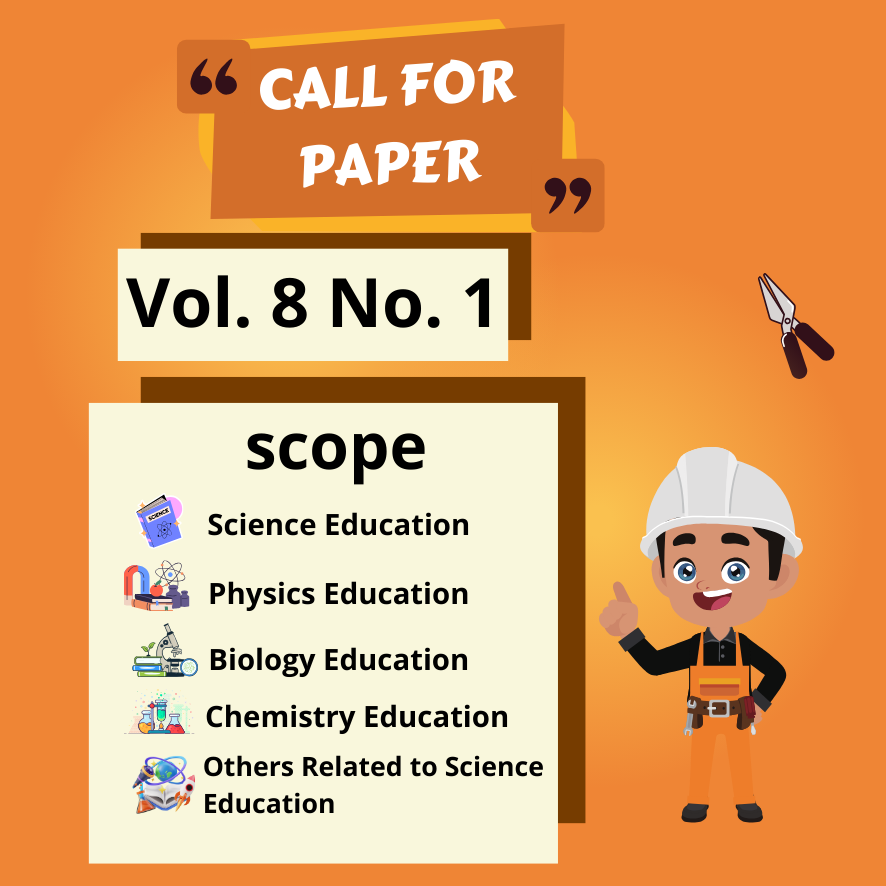LEARNING PHYSICS THROUGH COMICS MEDIA: AN ENHANCEMENT OF NEWTON LAW TOPICS ON ONLINE LEARNING
DOI:
https://doi.org/10.19184/se.v5i2.30900Keywords:
Comics, Newton's law, Physics, Science comic bookAbstract
Comics are visual media to convey messages entertainingly so that they can be used in education and have become a tool that can promote the enjoyment of learning. This study aims to explore students' learning outcomes on Newton's Law material when using comic-based learning media. This study uses a quasi-experimental design method in the form of a non-equivalent control group design. The population in this study are all students of class X MIPA of SMAN 1 Muara Badak in the 2021/2022 academic year, where the sample used is class X MIPA 2 as the experimental class and class X MIPA 3 as the control class. The experimental class applies comic-based learning media, and the control class uses conventional learning media. The data were collected using pre-test and post-test and then analyzed using the n-gain and independent t-test analysis. This study has established that comic-based learning media is better than conventional learning media. The results showed a significantly different learning outcome between the experimental and the control classes with the acquisition of sig-2 tailed 0.000. In addition, the results of the assessment also showed an increase in student learning outcomes, seen from the results of the n-gain test, where the experimental class showed a higher accumulation of 0.3779 and entered the average category compared to the control class, which was only 0, 1090, which is in the low category. Based on these results, comics could be a supportive media to learn physics at the high school level.
Downloads
References
Agustin, A. A., Junus, M., & Sulaeman, N. F. (2021). Analysis of Response, Motivation, and Student’s Learning Outcomes in a Blended Learning Assisted with Schoology. Journal of Mathematics Science and Computer Education, 1(2), 80. Doi: https://doi.org/10.20527/jmscedu.v1i2.3472
Ahsani, M. S., Yulianti, D., & Khanafiyah, S. (2015). Pembelajaran IPA Berbasis Inkuiri Berbantuan Komik Sains untuk Mengembangkan Karakter Siswa. Unnes Physics Education Journal, 4(3), 73–81.
Aleixo, P. A., & Sumner, K. (2017). Memory for Biopsychology Material Presented in Comic Book Format. Journal of Graphic Novels and Comics, 8(1), 79–88. Doi: https://doi.org/10.1080/21504857.2016.1219957
Avrilliyanti, H., Budiawanti, S., & Jam, J. (2013). Penerapan Media Komik untuk Pembelajaran Fisika Model Kooperatif dengan Metode Diskusi pada Siswa SMP Negeri 5 Surakarta Kelas VII Tahun Ajaran 2011/2012 Materi Gerak. Jurnal Pendidikan Fisika, 1(1), 156–163.
Chu, Y. L. L., & Toh, T. L. (2020). A Framework for Designing Mathematics Instruction Using Comics at The Primary School Level. JRAMathEdu (Journal of Research and Advances in Mathematics Education), 5(3), 218–230. Doi: https://doi.org/10.23917/jramathedu.v5i3.11373
Daryanto. (2010). Media Pembelajaran. Gava Media.
Hewi, L., & Shaleh, M. (2020). Refleksi Hasil PISA (The Programme For International Student Assesment): Upaya Perbaikan Bertumpu Pada Pendidikan Anak Usia Dini). Jurnal Golden Age, 4(01), 30–41. Doi: https://doi.org/10.29408/jga.v4i01.2018
Izzatunnisa, L., Suryanda, A., Kholifah, A. S., Loka, C., Goesvita, P. P. I., Aghata, P. S., & Anggraeni, S. (2021). Motivasi Belajar Siswa Selama Pandemi dalam Proses Belajar dari Rumah. Jurnal Pendidikan, 9(2), 7–14. Doi: https://doi.org/10.36232/pendidikan.v9i2.811
Kim, D. H., Jang, H. G., Shin, D. S., Kim, S.-J., Yoo, C. Y., & Chung, M. S. (2012). Science Comic Strips. Journal of Education and Learning, 1(2), 65–71. Doi: https://doi.org/10.5539/jel.v1n2p65
Lin, S. F., & Lin, H. (2016). Learning Nanotechnology with Texts and Comics: The Impacts on Students of Different Achievement Levels. International Journal of Science Education, 38(8), 1373–1391.
Meier, D. (2002). The Accelerated Learning Handbook. Kaifa.
Meirlin, T., Komariyah, L., & Efwinda, S. (2021). Pengaruh Respon Penggunaan Media Game Edukasi Quizizz dalam Pembelajaran Jarak Jauh terhadap Hasil Belajar Siswa Kelas XI SMA Negeri 3 Samarinda. Jurnal Literasi Pendidikan Fisika, 2(2), 117–125. Doi: https://doi.org/10.30872/jlpf.v2i2.615
Purwanto, N. (2009). Prinsip-Prinsip dan Teknik Evaluasi Pengajaran. Remaja Rosdakarya.
Putra, P. D. A., Sulaeman, N. F., Supeno, & Wahyuni, S. (2021). Exploring Students’ Critical Thinking Skills Using the Engineering Design Process in a Physics Classroom. Asia-Pacific Education Researcher, 2017. Doi: https://doi.org/10.1007/s40299-021-00640-3
Raiyn, J. (2016). The Role of Visual Learning in Improving Students’ High-Order Thinking Skills. Journal of Education and Practice, 7(24), 115–121. www.iiste.org
Rohman, M., & Amri, S. (2013). Strategi dan Desain Pengembangan Sistem Pembelajaran. Prestasi Pustaka Karya.
Sugiyono. (2015). Metode Penelitian Kuantitatif. Kualitatif dan R&D. Alfabeta.
Susanti, S., Alex, H., & Sri Handono Budi, P. (2019). Pegembangan Bahan Ajar Komik Fisika Berbasis Android Pada Pokok Bahasan Suhu dan Kalor di MA kelas XI. Jurnal Pembelajaran Fisika, 8(3), 208–213.
Tatalovic, M. (2009). Science Comics as Tools for Science Education and Communication: A Brief, Exploratory Study. Journal of Science Communication, 8(4). Doi: https://doi.org/10.22323/2.08040202
Wahyuni, A., & Lia, L. (2020). Pengembangan Komik Fisika Berbasis Kearifan Lokal Palembang di Sekolah Menengah Atas. Jurnal Penelitian Pembelajaran Fisika, 11(1), 37–46. Doi: https://doi.org/10.26877/jp2f.v11i1.4187
Wegasari, K. (2021). Dampak Pandemi Covid-19 terhadap Proses Pembelajaran Online di SDN Cabean 3 Demak. Jurnal Penelitian, 15(1), 27. Doi:https://doi.org/10.21043/jp.v15i1.9109



